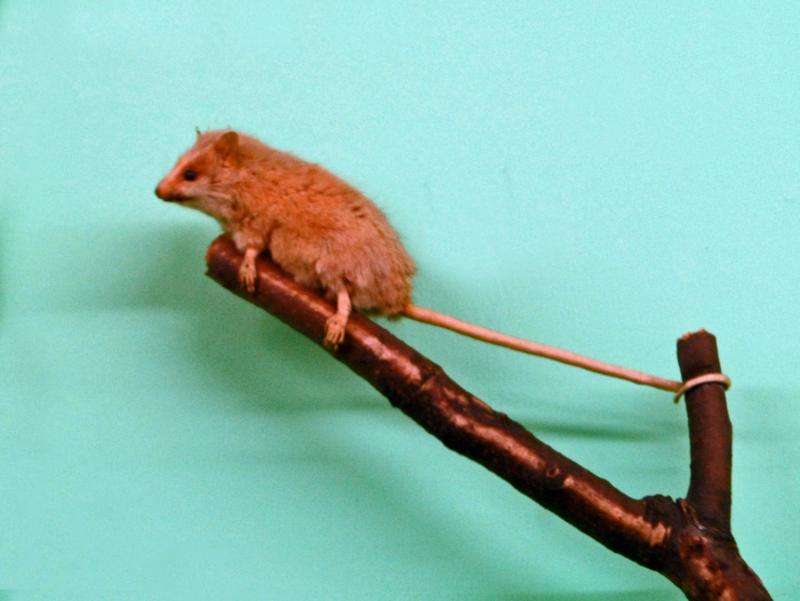June 17, 2015 report
Opossums found to be more social than thought

(Phys.org)—A team of researchers affiliated with several institutions in Brazil has found that opossums are more social in their dens than thought. In their paper published in The Royal Society Biology Letters, the team describes field studies they conducted in Brazil and the instances of social behavior they encountered.
Opossums are omnivore marsupials that include 103 known species, sometimes referred to as New World opossums to separate them from cousins living in and around Australia where they are known as possums (they are known by that name in most parts of the southern U.S. as well). Generally a docile animal (known for playing dead when threatened), and sometimes mistaken for really big rats, they have a reputation as a loners, keeping to themselves as they forage. But now, it appears that at least one species engages in gregarious denning, the researchers with this new effort report.
Anecdotal evidence of opossums suggests they typically avoid others of their kind (and others of other kinds as well) preferring to keep to themselves. They have been known to hiss when encountering other opossums or other animals.
To learn more about the animals, the researchers went out into the field and set up 312 artificial nests in an Atlantic Forest site in Rio de Janeiro, making for rather easy observation of the animals throughout all stages of their lives. They study, conducted over an eight year span included 17,127 observations of opossums in their nests. The team reports that they found ten instances where there were multiple opossums using the same den without being hostile to one another and where there was no sexual activity going on either. They also found one instance where thirteen opossums were living in one nest with members from three different age groups.
The team also found that because of the gregarious denning, it appears likely that opossums might engage in social nest building and even pair bonding before mating. They do acknowledge that their results might have been impacted by the nests being artificial in nature—some of the nests were much bigger than those found in nature, and might have contributed to the social behavior of the opossums.
More information: First evidence of gregarious denning in opossums (Didelphimorphia, Didelphidae), with notes on their social behaviour, Biology Letters, DOI: 10.1098/rsbl.2015.0307
Abstract
The Didelphidae are considered solitary opossums with few social interactions, usually limited to mating-related or mother–pouch young interactions. Anecdotal reports suggest that additional interactions occur, including den sharing by a few individuals, usually siblings. Here, we report novel observations that indicate opossums are more social than previously thought. These include nest sharing by males and females of Marmosa paraguayana, Gracilinanus microtarsus and Marmosops incanus prior to the onset of the breeding season and without signs of sexual activity; this is taken to indicate early pair-bonding matching and cooperative nest building. We also recorded den sharing among recently weaned siblings of Didelphis aurita and Caluromys philander. In addition, we observed 13 individuals of Didelphis albiventris representing three age classes resting without agonistic interactions in a communal den. These are the first reports of gregarious behaviour involving so many individuals, which are either unrelated or represent siblings from at least two litters, already weaned, sharing the same den with three adults. Sociality in opossums is probably more complex than previously established, and field experimental designs combining the use of artificial nests with camera traps or telemetry may help to gauge the frequency and extent of these phenomena.
Journal information: Biology Letters
© 2015 Phys.org



















